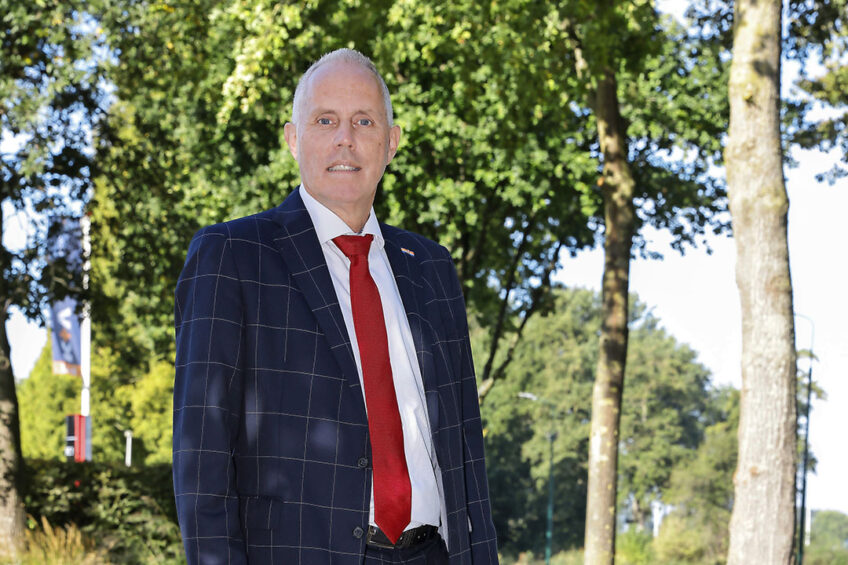‘Bright future for EU broiler production’

AVEC chairman Gert-Jan Oplaat: “The very high standards of production in the EU on environmental protection, animal welfare, food safety and animal health, puts EU producers in a competitive disadvantage when it comes to production costs.” AVEC has a number of clear targets ensuring a level playing field.
The members of the Association of Poultry Processors and Poultry Trade in the EU countries (AVEC) include national organisations that represent the poultry industry and poultry trade in 17 European countries. The member organisations of AVEC are represented in the board by 1 board member and 1 deputy board member.
In the spring of 2022, the question arose whether Gert-Jan Oplaat wanted to succeed Paul Lopez as chairman. “In September 2022, I was elected as chairman by the AVEC board in Riga, Latvia,” said Oplaat. “I have therefore resigned all other ancillary positions, supervisory directorships and other supervisory positions. Of course I will remain chairman of the association of the Dutch Poultry Processing Industry (Nepluvi) and from June 13th I will be a BBB senator for the Dutch 1st Chamber. BBB is the farmers’ party of the Netherlands.”
Did Nepluvi agree with your appointment to AVEC president?
“I have indeed consulted with the Nepluvi board and they said that it would be good for both the Dutch and European poultry sectors if I became chairman. This is because I have a lot of experience through all the administrative positions and supervisory directorships I have had in the past and which I have now.”
Who do you actually represent as AVEC chairman?
“Although there are 17 European countries – and not all of the 27 EU countries represented in AVEC – I do represent the entire European poultry meat sector. That includes the United Kingdom, since after Brexit we have decided to keep BPC as an associate member. So, we do pay attention to the interests of the UK poultry sector, except the trade aspect. As the fourth-largest producer of poultry meat in the world – 3rd when the UK was in the EU – the EU produces €38 billion worth of poultry meat and employs more than 370,000 people. We also represent about 25,000 [poultry] family businesses.”
Do you expect the broiler sector (and periphery) in the EU to consolidate or grow in the coming years? Now the annual growth is about 1%, right?
“The European poultry sector has a bright future ahead of it. According to the OECD/FAO Agricultural Outlook 2022, the consumption of poultry meat is expected to increase by 13% worldwide in the next 10 years, while the growth in the consumption of beef and pork meat lies around 6-7%. As European poultry production is among the most sustainable in the world, the forecasts are rosy. The condition for this, however, is that we are operating on a level playing field. Nor should Brussels impose such restrictions that other players in the world can take over our markets with less sustainable production.
“European poultry production is among the most sustainable in the world”
“In the coming period, AVEC will devote a great deal of attention to holding talks with the European Commission and European parliamentarians about being able to maintain the excellent position that the European poultry sector has in the world. This is mainly prompted by the farm-to-fork strategy adopted in Europe. This policy means that the production method must be made more sustainable. More animal-friendly production is possible, but not without increasing the environmental impact. We need to look for a good balance in all of this.”
How do you see the position of the European broiler sector in relation to the rest of the world?
“The very high standards of production in the EU, being on environment protection, animal welfare, food safety and animal health, puts EU producers in a competitive disadvantage when it comes to production costs. This is especially the case in comparison with producers in the rest of the world who do not have to comply with the same export standards. This is why we need (market) protection and unfortunately this protection is traded as a currency against products that the EU considers more important to export. Think, for example, of European cars or other luxury products that are exported worldwide. So, one of my main policy points will be that I want to get rid of that so-called ‘trade-off’ position of poultry meat. Our European poultry sector and our producers should not be sacrificed to other sectors.”
How do you view the Mercosur trade deal?
“These are the countries Brazil, Argentina, Paraguay and Uruguay. I am not in favour of the trade agreement with those countries as long as no fair trade is in place. As explained earlier, in the EU we have very high demands and many more regulations are coming into effect to EU producers in the coming months if the EU introduces Green Deal and Farm to Fork policies. Our Mercosur friends have to understand that we have nothing against trade, as long as it is fair and held on a level playing field. Incidentally, the European farmers’ interest organisation Copa Cogeca is also opposing the Mercosur trade agreement. And in this context I also consult with the 3 European Commissioners of agriculture, trade and environment regarding Mercosur.
“One interesting element regarding Mercosur and more generally South America is that we see that most countries start to be affected by highly pathogenic avian influenza (HPAI) since the virus is now present in almost all South American countries in commercial flocks, with the notable exception of Brazil, which has only declared wild bird cases. We are sorry to see that and we support these countries in their fight against this horrible disease. At the same time, we are looking forward to seeing the result of a DG SANTE audit mission on animal health in Brazil, to understand how they manage to keep the virus out of commercial flocks. Our EU producers of course have lost millions due to trade restrictions following multiple avian influenza outbreaks in the EU. HPAI is a global issue now and we have to work collectively to find solutions.”
The EU recently wanted to take the decision that Ukraine will be allowed to sell tariff-free products in the European Union for one more year. What do you think of that?
“It is correct that Ukraine could export products tariff-free to the EU until the first of June 2023. And the EU has extended it for one more year. Let me first say that we wholeheartedly support the people of Ukraine in their situation. There’s no discussion about that. And that the European Union allows free trade for a certain period of time to support the country, we can also understand that somewhat. What we as AVEC do have difficulty with, however, is that this support almost only favours 1 Ukrainian company. The Ukrainian people and poultry sector are therefore not supported with this free trade.
“Animal welfare is an important subject to us, its in our DNA”
“We see that the import of Ukrainian poultry meat is very disruptive to the EU market because they export almost 20,000 tonnes per month to us. Last year they increased their exports to the EU by 80% with just 6 months of free-access to the EU. So that is destructively distorting the EU market. A number of countries within the EU, namely Slovakia, Poland, Hungary and Romania, have started to complain about the consequences of tariff-free imports on their local production, especially for grains. They even blocked temporarily imports of grains from Ukraine. This clearly indicates that many EU countries experience strong market disruptions.”
What should we do with animal welfare in the coming years in the EU as far as the broiler sector is concerned?
“Animal welfare is an important subject to us; its in our DNA. It is good to take a closer look at how you can guarantee animal welfare, but always in a way that you can maintain efficient and affordable production. And of course this will also have to apply to all imports into the EU in connection with the level playing field.”
What are your thoughts on the BCC (Better Chicken Commitment)?
“I think it is good that such developments come from the market itself and are not forced. In that respect, it is a textbook example of how the sector takes its responsibility to take steps forward. I welcome such initiatives as long as it is voluntary concepts that help to create diversity in the market. European poultry meat producers are ready to produce products with higher animal welfare standards.”
You have already mentioned that sustainability is becoming an important theme. What are the targets for AVEC in that regard?
“Within AVEC we have written a so-called ‘sustainability charter’ that we will implement in the coming years. In broad terms, this means that we want to continue our production with the best possible balance on the following points: low environmental impact, good welfare, and a financially healthy sector that produces affordable products. As the poultry meat sector, we have an advantage compared with the other sectors, given the sustainable nature of our sector. Ultimately, the call for sustainability will have to take shape, doing justice to the ‘P’ of Planet, the ‘P’ of People and the ‘P’ of Profit.”
There is discussion that long-lived poultry in Europe should be vaccinated by mass vaccination against avian influenza. Is this acceptable for the European broiler sector?
“It is important to note that vaccination is not the solution that will solve the avian influenza problem once and for all. It can be part of a strategy, but many other measures must be taken as well. Each EU country will have to make a risk assessment in order to find the best strategy in their particular area. EU authorities have published very stringent rules to define a frame on how vaccination should be implemented. We have to make sure that these costs are not only worn by the producers. Furthermore, of course, it has to be done under the conditions that the vaccine is registered (and therefore safe) and the products can be continued to be sold everywhere.”












